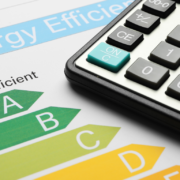In 2025 Energy Performance Certificate (EPC) criteria is going to change.
Private landlords will need to take on a greater responsibility regarding the efficiency of their properties due to change in government regulations.
What specifically is changing? From 2025, EPC ratings for new buy-to-let rental agreements will need to have an EPC rating of ‘C’ or higher.
This is a 2-step rise from the current minimum, which sits at rating ‘E’.
From 2028, all buy-to-let properties within the private rental sector will need to follow these new regulations.
What challenges does this new regulation pose for landlords?
Consider the cost
One important factor that landlords will need to start considering and preparing for – the cost of property modifications. For many landlords, this is coming at a difficult time.
The National Residential Landlord Association (NRLA) latest data shows that the pandemic has witnessed 23% of private landlords face a loss of rental income.
Thankfully, there is a range of different things property owners can do to improve their energy efficiency, with a variety of price tags.
Changes such as heat pumps and mechanical ventilation with heat recovery systems (MVHR) can have huge impacts on the efficiency of a home and on average cost between £2,000-£4,000 according to Checkatrade.
Smaller, cheaper options can range from including a smart metre (provided free from some electric companies), changing all halogen bulbs to LED bulbs, draught proofing (professional draught-proof could cost around £200 for a whole house) and adding a mist shower to minimise on wasted water.
Whereas more expensive changes could include increasing insulation (from £6,000 – £20,000 depending on the size of your property), adding solar panels, installing a new boiler or including double/triple glazed windows (potentially £4,000 – £7,500).
Properties with higher energy efficiency often result in cheaper energy bills, and with energy pricing about to spike – investing in EPC improvements now could be more attractive to prospective tenants in the near future.
Re-financing for refurbishments
Whilst 2025 may not feel like the near future, getting ahead of the game could provide long-term savings.
Now is an ideal time for homebuyers to start considering residential EPC changes as an investment opportunity.
If you’re thinking of moving house and letting out your current property, now would be an ideal time to re-mortgage.
Interest rates are currently remaining low, and even after a second rise in the base rate in the past 3 months, now is the opportune moment to take advantage of competitive rates and raise capital through re-mortgaging a property.
This would therefore generate the sufficient funds needed for the potential works and begin their preparations for the EPC change.
Furthermore, now is a great time to lock yourself into a long term fixed product to protect yourself against any future rate increases.



























Regarding the installation of heat pumps to improve energy efficiency of rental properties, I have just been in by my epc inspector that installing a heat pump can lower the epc rating of you property as the heating is now run by electricity. You should look into this before paying for a costly upgrade. This seems like another clumsy intervention by the government that will result in higher rents for our tenants.